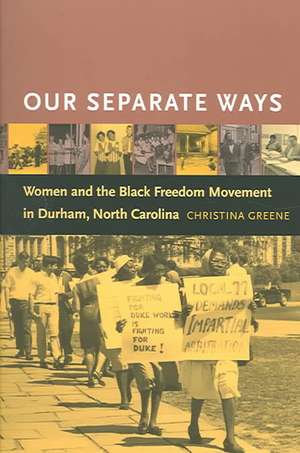Our Separate Ways: Women and the Black Freedom Movement in Durham, North Carolina
Autor Christina Greeneen Limba Engleză Paperback – 31 mar 2005
Preț: 289.15 lei
Nou
Puncte Express: 434
Preț estimativ în valută:
55.34€ • 57.56$ • 45.68£
55.34€ • 57.56$ • 45.68£
Carte tipărită la comandă
Livrare economică 15-29 aprilie
Preluare comenzi: 021 569.72.76
Specificații
ISBN-13: 9780807856000
ISBN-10: 0807856002
Pagini: 384
Dimensiuni: 154 x 225 x 24 mm
Greutate: 0.56 kg
Ediția:New.
Editura: University of North Carolina Press
ISBN-10: 0807856002
Pagini: 384
Dimensiuni: 154 x 225 x 24 mm
Greutate: 0.56 kg
Ediția:New.
Editura: University of North Carolina Press
Notă biografică
Christina Greene is associate professor of history in the Department of Afro-American Studies at the University of Wisconsin-Madison. She lived in Durham for twelve years, where she directed the Duke-University of North Carolina Center for Research on Women and worked for the Institute for Southern Studies.












